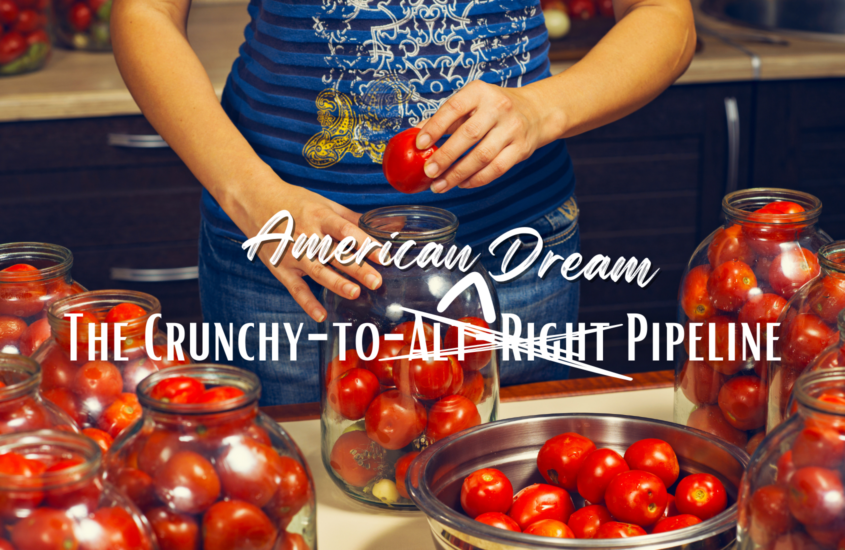The Crunchy-to-American Dream Pipeline
AmericanMom Team |
When The Atlantic posts an article directly correlating the “crunchy” lifestyle with the KKK and white supremacy, it’s hard not to write a direct response. And though we at AmericanMom try our best to focus less on politics and more on lifestyle, we felt we needed to defend our audience and point out the flaws of The Atlantic’s article. So here goes.
First, we highly recommend you read The Atlantic article that inspired this defense. Then, we’d like to offer these following points.
The Atlantic’s Falsehoods
“And let’s not be confused about the endgame. White-power activists, then and now, envision an all-white ethnostate or world achieved through profound violence, and no macrobiotic diet or apple-cider-vinegar remedy can ameliorate that message” – Kathleen Belew, The Crunchy-to-Alt-Right Pipeline
The Atlantic is confusing humanity’s innate desire for freedom, God-given free-will, as well as the dignity of owning your own property, providing for yourself, addressing the root causes of disease, and honing a valuable skill with an ideology and group that has its roots in the Left. I’d like to state for the record that the KKK was not started, nor revived and perpetuated, by only people on the Right (in fact, there is plenty of evidence to show that the Right and Republicans rarely have anything to do with the KKK). Racism is not a Right issue, and white supremacy is not reliant on crunchy.
Arguably, “crunchy” has more left-leaning roots as well since it, as the author of the Atlantic Article points out, started with the hippie movement in the mid-Twentieth Century. The problem is that the author of this article fails to recognize the overall benign presence, and in most cases beneficial existence, of crunchy and instead chooses to take the exception — that crunchy happened to be part of some white-supremacist extremist groups — and make it the rule. There is no exploration of the modern crunchy lifestyle in The Atlantic article penned by Kathleen Belew, simply a dismissive attitude that sorrowfully reports that crunchy includes “spacing out childhood vaccinations” against what “pediatricians recommend” and not chugging fluoride without looking into its origins, uses, and side effects. As if those are the worst crimes against humanity.
But here’s the thing; racism and extremism are not purely Right-wing. Being crunchy isn’t purely Right-wing. And drawing a line between white-supremacy and crunchy is a logical fallacy that ignores the minutiae, research, and WHY of it all.
“The Ku Klux Klan (KKK) extended into almost every southern state by 1870 and became a vehicle for white southern resistance to the Republican Party’s Reconstruction-era policies aimed at establishing political and economic equality for Black Americans. Its members waged an underground campaign of intimidation and violence directed at white and Black Republican leaders. Though Congress passed legislation designed to curb Klan terrorism, the organization saw its primary goal–the reestablishment of white supremacy–fulfilled through Democratic victories in state legislatures across the South in the 1870s.” – History.com
Let’s not be history deniers here; the Left can be racist too, and often is. One problem with Belew’s logic in her article is the assumption that Right-wing and racism are irrevocably interlocked and always have been, and the Left is a clean angel of a political stance. So let’s be clear; anyone is capable of being racist, there have been many racist groups over the years, they have each been made up of many different types of people and adopted many different ideologies and lifestyles.
Belew talks about extremist groups from history. All of them had sought separation from the State and often used “organic”, “natural”, and “crunchy” as parts of their lingo, some even using crunchy as a springboard for recruitment. These groups were religious, secular, conservative, liberal, and everything in between. But instead of pointing out humanity’s tendency towards extremism, especially against governments, and that this is to be expected statistically of groups formed with “defiance” and “justice” as their main goal, Belew is saying that because certain extreme groups existed in the past, because a handful had white-supremacist leanings, and because they happened to also grow their own food and avoid chemicals, then therefore all crunchy living is white-supremacy. A logical fallacy that should strip Miss Belew of her History Professor title.
The insult that is the relationship between white-supremacism, the KKK and the crunchy lifestyle drawn by Belew is incalculable. While it is easy to see how she finds hints of extremism within these communities, it is a falsehood to act as though extremism is not possible in nearly every area of belief, politics, lifestyle, and economics. I could point to many areas of Leftist extremism plaguing our world this very minute. Additionally, it is incorrect to even say that white-supremacy is a purely Right form of extremism as racism clearly exists at all points on the political spectrum, and the Left is historically just as guilty of racist leanings as the Right.
Belew’s assessment is an ignorant stance on modern self-sufficiency and the current crunchy trend to say the least. It is a poorly researched approach to understanding the WHY behind the revival of crunchy culture. It is a blind and naive trust in institutions that have done nothing to deserve it and condemnation of a group of people who will, in all likelihood be the only ones alive and well enough to come to Belew’s rescue when there isn’t food on the shelves or a doctor who actually listens.
So Let’s Talk Crunchy
The current, and historic idea of being crunchy has its roots in the belief that anyone can find freedom, that everyone is capable of providing for themselves, owning land, raising a family, finding security in self-sufficiency, and building a legacy for future generations to inherit. In fact, it cuts government out as completely as possible, and is not an idea that would thrive under a utilitarian system or dictatorship. As a result, it would not live long under Fascism or Communism, and even Socialism would, in the end, have a hard time thriving with the crunchy mindset at the helm. Crunchy, especially in its modern form, is as inclusive as it gets and encourages anyone currently subjugated under the puppetry of the powers-that-be to seek higher ground and depend on God, self, and family (in that order), before any sort of government body. Additionally, modern crunchy often depends on Conservative values and principles.
The modern interpretation of the homesteading, off-grid lifestyle and mindset is that of resourcefulness. It is no secret that our modern systems are fragile – think truckers, gas prices, burned down chicken farms, farmland bought up and developed. What we have we may not always have. Certainly we should rely on God and His Grace and Plan, but part of that is doing a little bit of the work ourselves using the resources with which God has blessed us.
During both World Wars, the country was saved from starvation and food shortages by Victory Gardens. People had to learn and learn quickly how to provide for themselves, because the war effort needed all the resources it could get and that would potentially leave the folks back home with nothing. Times were still tough, but many found salvation in self-sufficiency, small-scale homesteading, DIY home cleaning supplies, and many other things that would be categorized as crunchy today.
The modern revision of crunchy has, almost completely, abandoned its origins of being only for hippies who live in a commune, and is now accessible to anyone anywhere. It’s more of a spectrum now, including people who live in a tiny apartment in the heart of the city who have stopped using plastic, as well as the country-dwellers who raise cattle and drink raw milk. It is so much more than sticking it to the man and has developed into a health- and human-focused lifestyle practice of taking care of yourself and being mindful of what you consume. It is being a smarter, more resourceful consumer, and embracing a life not dependent on others or fragile systems run by corrupt individuals.
Using What God Gave You
But more than that, crunchy has become associated with developing and honing skills to the benefit of oneself and the community. Imagine a group of women, connected through church or just neighborly closeness, sharing canned goods and vegetables harvested from home gardens, being a source of homemade vanilla (when it’s $10+ per 4 oz.), knowing how to compost and making sure everyone they know gets some in the spring. Imagine women saving their families hundreds of dollars a year by making their own meals, laundry detergent, deodorant, dishcloths, etc. Imagine these women sharing their talents with each other and all of them, as well as their families, thriving. Imagine them finding power and fulfillment in their ability to not just make something, but multiply it. Is this not the village we should be talking about and cultivating?
Having a skill is no longer a societal must – it’s a sign of Right-wing extremism (according to The Atlantic). Because, in the end, that is the majority of homesteading and self-reliance, homemaking and off-grid living – skill. It is having a valuable, in some cases life-saving, skill. Surely we should be wary of extremism, of group-think, and wild, violent ideas. But we shouldn’t be shamed and ostracized because we know how to do something and do it well.
Living What The Left Preaches
Finally, we live in a society where you can buy organic vs. not and somehow it’s acceptable to be completely aware that you can pay more for pesticide free or choose the pesticides. Our world’s a little backwards right now, and companies are not ashamed to profit by selling the exact same item in both the eco-friendly packaging and plastic. But if people decide to try to live an organic lifestyle themselves, avoid plastics, make their own where they can, live without pesticides, reuse and recycle, compost, and farm, they are Right-wing extremists, or worse white-supremacists.
Why is it considered hip and trendy, and even (though it’s a dirty word now) healthy, to buy organic in the grocery store, but extremist to have chickens and a garden? How often do you hear the Left (the Right, too, but especially the Left) harp on about being eco-friendly? How often do celebrities stand up and pound the podium, pointing their finger at everyday citizens and blaming them for “global warming” and then go hop on a private jet to globe trot? How often do politicians try to jam through regulations and policies that restrict and restrain farmers, while demanding lower grocery prices? All of these things, and much more, spill from the mouths of those who are not willing to practice what they preach, while anyone who is a steward of all their possessions is labeled, shamed, bullied, belittled, and demonized by The Atlantic.






